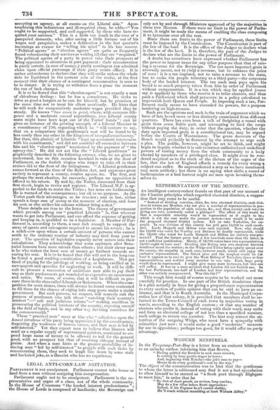LEGAL ANTI-CORN-LAW AGITATION.
PARLIAMENT is not omnipotent. Parliament cannot take house or land from a man without assigning him compensation. Parliament ought not to be omnipotent. Parliament is the re- presentative and organ of a class, not of the whole community. In the House of Commons "the landed interest predominates' ; the House of Lords is composed of landlords; the Sovereign can
only act by and through Ministers approved of by the majorities in these two Houses. If there were no limit to the power of Parlia- ment, it might be made the means of enabling the class composing it to tyrannize over all the rest.
Since there are limits to the power of Parliament, these limits must be imposed by the Constitution. The Constitution is part of the law of the land. It is the office of the Judges to declare what is the law of the land. It is, therefore, the part of the Judges to declare what are the limits to the power of Parliament.
A doubt has sometimes been expressed whether Parliament has the power to impose taxes for any other purpose than that of rais- ing a revenue for the Sovereign. The tax upon imported grain is avowedly meant, not to yield a revenue, but to enhance the price of corn : it is a tax imposed, not to raise a revenue to the state, but to make the people tributary to a third party—the corporate body of the landed interest. The tax each man pays upon his bread is so much property taken from him by order of Parliament without compensation. It is a tax which may be applied (some say is applied) by those who receive it to bribe electors, and thus pack a Parliament which shall persevere in a policy calculated to impoverish both Queen and People. In imposing such a tax, Par- liament really seems to have exceeded its powers, for a purpose bordering on high-treason.
Such are the opinions and such is the train of argument which we have of late heard more or less distinctly enunciated from different quarters. There has even been a talk of freighting a vessel with grain from some Baltic port, and attempting to land the cargo without paying the duty, in order that the question, whether the duty upon imported grain is a constitutional tax, may be argued before the Courts of Westminster. The grave decorum of the Bench would probably be fluttered by the attempt to urge such a plea. The public, however, might be set to think, and might begin to inquire whether it is safe to intrust unlimited and undefined powers of raising money from the whole community to a body elected by members of a privileged class. It might even be ren- dered sceptical as to the truth of the dictum of the sages of the law, that the law of England affords a remedy for every wrong a subject can suffer. So unprecedented a step as we have mentioned may seem unlikely ; but there is no saying what shifts a round of bankruptcies or a bad harvest might set men upon betaking thou- selves to.


























 Previous page
Previous page